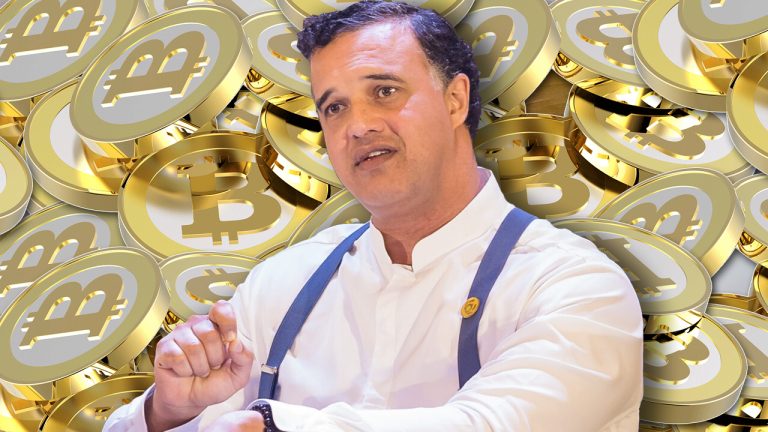 The former CEO of Paxful, Ray Youssef, has told users of the peer-to-peer bitcoin marketplace that he is no longer in control and therefore cannot vouch for “anything that is happening there now.” Youssef also told a user who claimed to have been scammed on the platform that he too has been banned from the […]
The former CEO of Paxful, Ray Youssef, has told users of the peer-to-peer bitcoin marketplace that he is no longer in control and therefore cannot vouch for “anything that is happening there now.” Youssef also told a user who claimed to have been scammed on the platform that he too has been banned from the […]
“I gave up my title as CEO to unfreeze these accounts and am also in danger of being in contempt of court,” said Ray Youssef.
The chief executive officer of peer-to-peer crypto marketplace Paxful has announced the unfreezing of 88% of previously frozen user accounts more than a week after suspending operations.
In an April 16 Twitter thread, Paxful CEO Ray Youssef said roughly $4.4 million in frozen funds remained on the platform after staff had unfrozen 88% of existing accounts. According to Youssef, the unfreezing of accounts had been accomplished “with no engineers or compliance folks,” claiming all remaining frozen funds were “in the hands of” United States financial regulators.
Youssef said though roughly 3% of total user funds were still frozen, he had made the unfreezing his “final act” as Paxful's CEO:
“I gave up my title as CEO to unfreeze these accounts and am also in danger of being in contempt of court,” said Youssef. “That is what I did besides a lot of sleepless nights. Nothing more I can do but sleep well tonight. Integrity trumps risk.”
4.4m of frozen funds remain in Paxful, about 3.3% of total customer funds. We freed a total of 3m this year thru tremendous compliance effort. Those who would say that I am somehow destroying my reputation to steal 4m bucks are mad. I don’t have a price 4million or 4 trillion. pic.twitter.com/MU6GdUweZF
— Ray Youssef (@raypaxful) April 16, 2023
Related: Paxful shutdown hits Nigeria harder than the rest of the world — Here’s why
The "contempt of court" claim was likely related to ongoing litigation between Youssef and Paxful co-founder Artur Schaback, who helped launch the platform in 2015. Schaback claimed in court the company had been involved in the misappropriation of funds, money laundering and evasion of U.S. sanctions. Youssef told Cointelegraph at the time the allegations were “ridiculous.”
The announcement followed the suspension of operations for Paxful users on April 4. At the time, Youssef said there had been some “key staff departures,” citing “regulatory challenges” the platform was facing. The CEO had already authorized refunds for Earn program users affected by the collapse of Celsius months prior.

Two major P2P platforms announced their closure in the first quarter of 2023. Many blame it on growing regulatory scrutiny, but experts call for better alternatives.
A peer-to-peer (P2P) cryptocurrency exchange is an online marketplace that connects buyers and sellers of cryptocurrencies like Bitcoin (BTC). The platform enables them to conduct direct business with one another without the need for intermediaries.
When purchasing cryptocurrency on a P2P exchange, a buyer transfers the agreed-upon amount from their account to the seller. The payment is not made between a consumer and a money services company but between two distinct customers.
P2P exchanges were once the lifeline of the crypto ecosystem, owing to the ease of exchange and privacy features that these platforms offered. However, in 2023, some of these key features have driven them to fall under increased scrutiny from regulators.
On Feb. 9, 2023, Finland-based P2P exchange platform LocalBitcoins announced it was closing after 10 years in service. The platform cited tough market conditions owing to the ongoing crypto winter, along with increasing regulatory pressure and declining market share.
The abrupt closure of one of the oldest P2P Bitcoin trading platforms came within weeks of the United States Financial Crimes Enforcement Network (FinCEN) naming the platform as one of the largest Bitcoin counterparties to the Russian-affiliated exchange Bitzlato.
Bitzlato was the target of a significant enforcement action by U.S. officials who accused the platform of violating of Anti-Money Laundering rules and aiding in the evasion of Russian sanctions.
Another prominent P2P Bitcoin exchange platform Paxful, founded in 2015, suspended operations on April 4. The platform cited the ongoing regulatory environment and staff departures as the reason behind its closure. In a Twitter space, CEO Ray Youssef dwelled more on their decision and said even though American regulators have done a lot of catching up in the past five years, they “still don’t get it. They grow more suspicious every day.”
An update from @paxful pic.twitter.com/X3eN5OcKrT
— Paxful (@paxful) April 10, 2023
The ongoing court battle between Artur Schaback and Youssef over the control of the firm was also seen as a prominent reason behind its downfall. According to court filings, the two co-founders are currently at loggerheads over who will manage the business and have made a number of charges against one another. The accusations include, among other things, the theft of corporate finances, money laundering and circumvention of U.S. sanctions on Russia.
In an interview with Cointelegraph, both Schaback and Youssef continued their blame game and pointed fingers at the other person. Youssef claimed his co-founder’s legal tactics “bordered on terrorism” and cost Paxful many employees and directors. On the other hand, Schaback said Youssef took unilateral action to shut down Paxful on April 4, and he had no say in the day-to-day operations of the company for almost 18 months.
Recent: Crypto in Europe: Economist breaks down MiCA and future of stablecoins
Richard Mico, chief legal officer of global on- and off-ramp crypto platform Banxa, told Cointelegraph that the breakdown of relationships between the co-founders resulting in litigation could be one of many reasons behind the downfall of Paxful. He added that the ever-evolving regulatory scrutiny in the U.S. had made it difficult for the decentralized crypto platforms and P2P exchanges to thrive:
“Paxful has faced regulatory scrutiny in the past over claims of money laundering and fraud on its platform. In May of 2021, the New York State Department of Financial Services (NYDFS) ordered Paxful to bolster its KYC/AML processes. It is very possible that Paxful is fearful of future ongoing investigations and remediations,” Micro told Cointelegraph.
He said that, aside from concerns over shifting regulatory requirements, market conditions are driving significant consolidation in space. However, he is hopeful that “more transparent regulation in the U.S. will enable both P2P and other exchanges to flourish in a manner that strikes the appropriate balance between consumer protection and innovation.”
P2P platforms have been instrumental in flourishing crypto adoption especially in developing nations and offering banking services to the unbanked. Paxful was a pioneer of crypto adoption in Nigeria, and its shutdown hit many users in the country hard.
Freelancers often used the platform to convert their wages to and from Bitcoin and make payments to each other, while traders made use of its escrow service to conduct business. As such, the closure has left many of these users in Nigeria wondering about the future of the domestic crypto marketplace.
The Indian government imposed a banking ban on crypto exchanges in 2019 cutting all banking facilities to such exchanges. However, WazirX, one of the early crypto exchanges in India, introduced its P2P platform to ensure people were still able to trade their assets. Indian crypto traders turned to P2P platforms again in 2021 after the government imposed a hefty 30% tax on crypto transactions.
Former WazirX CEO Nischal Shetty seemed more optimistic about the future of P2P platforms, particularly in the developing world. He told Cointelegraph that P2P platforms with proper Know Your Customer protocols “help onboard users, especially in developing countries without banking access, and will continue to exist.”
Nick Saponaro, CEO of decentralized payment platform provider Divi Labs, told Cointelegraph that the closures will be painful for unbanked and underbanked traders, hindering their ability to transact locally and globally.
“Countries like Malawi, where citizens are well-capitalized but have restrictive banking practices that only allow customers to withdraw a few USD daily — P2P exchanges are necessary for those individuals to interact with the global financial infrastructure,” he explained.
Ben Jorgensen, co-founder and CEO of Web3 interoperability platform Constellation Network, told Cointelegraph that the closure of P2P platforms is, unfortunately, a massive blow to developing nations, but most likely, these developing nations will see more and more native P2P exchanges crop up.
The declining popularity of P2P platforms and the recent closure of some of the oldest P2P platforms are also attributed to the new availability of better alternatives, as there are now more practical on-ramps that enable users to buy cryptocurrency using their bank accounts and credit cards.
The costs of doing business are also important. For example, exchanges like Coinbase spend millions of dollars just to comply with local regulations. The unbanked communities throughout the world stand to gain the most from P2P exchanges, but given the growing regulatory compliance requirements, it is unlikely that they will produce the volumes required to support them on a large scale.
Saponaro told Cointelegraph that the only way new and existing P2P exchanges will survive is as ancillary services offered by licensed operators:
“For example, Binance has a P2P platform; however, the business model is not profitable enough to be the sole revenue stream in a fully regulated environment.”
Marc Taverner, a founding member of Swiss-regulated crypto and fiat on-ramp platform Xerof, told Cointelegraph that users often switch from P2P platforms to other trusted solutions because they need to minimize counterparty risk. Users are naturally migrating to providers that can address these risks:
“We are seeing increasing demand for trusted, transparent and compliant solutions, and it will be operators with licenses from established and respected jurisdictions who will onboard most of these users. P2P markets will still exist. The long-term question just remains how they will cope with heightened regulatory requirements,” he said.
Recent: Why join a blockchain gaming guild? Fun, profit and create better games
Jorgensen said that P2P platforms will continue to evolve just like decentralized exchanges and explained, “Although DEXs [decentralized exchanges] are technically peer-to-peer exchanges, they are catered more to a trustless state with much better fees. In terms of regulation now and in the foreseeable future, cash-to-crypto and crypto-to-cash will likely end up where most if not all regulation will be enacted. Think about it. It makes sense that when entering and exiting crypto, like when you are entering and exiting stocks in trade, these cash-in and cash-out points are documented [...] Ultimately governments want to tax these transactions, and this approach is the least complicated way to do so.”
The shutdown of major P2P platforms in 2023 has become a sign of evolving regulations, especially in the United States. However, experts believe that P2P platforms will still play a key role in developing nations, and these nations will move toward launching their native platforms to overcome the closure of popular global platforms.

A bitter dispute between Paxful's co-founders in Delaware courts may have led to the crypto marketplace's sudden closure.
A bitter dispute between Paxful’s co-founders, Artur Schaback and Mohamad (Ray) Youssef, in Delaware's courts may have been the real reason behind the Bitcoin marketplace’s sudden closure on April 4.
Schaback and Youssef, who started Paxful in 2015 with a shared passion for Bitcoin (BTC), are now litigating the company’s control, with several accusations against each other, according to court documents. The allegations include misappropriation of company funds, money laundering and evasion of United States sanctions against Russia, among others.
Schaback was the chief operating officer of Paxful until February 2022, when he was allegedly blocked from participating in the company’s operations over disagreements with Youssef — Paxful’s CEO — about the marketplace’s future and operations, including conflicts about “the legitimacy of ever-increasing expenditures to undisclosed entities.”

According to Schaback’s claims in the lawsuit, a large quantity of Paxful’s Bitcoin has been transferred to a Turkish entity called “EMiR,” which he claims is not a legitimate software company. “It does not have a website publicizing software or web development services and its physical address [...] appears to belong to a clothing company.”
Dekslektika, a St. Petersburg, Russia-based company owned by former Paxful directors, is a subcontractor allegedly receiving payments from EMiR. As per the court filings, those entities were accused of being behind “massive non-ordinary-course transactions” that began after Schaback was frozen out of the company’s operations. “There is no legitimate business purpose for these transfers,” says the lawsuit.
In comments to Cointelegraph, Youssef classified the claims as "ridiculous." According to him, the accusations center around salary payments to a Turkish engineering company working for Paxful. “He [Schaback] blocked these salary payments to our engineers with these accusations, claiming they were fake and even that they were performing no such services. He played an insane game of chicken until the entire team of 80 engineers stopped working. [...] Mr. Schaback himself was forced to admit that this was a critical mistake and authorized these engineers to be given their back pay at a board meeting,” noted Youssef.

Youssef claimed his co-founder’s legal tactics “bordered on terrorism” and cost Paxful many employees and directors. “His accusations were so slanderous that we lost our GC, CTO, CISO, VP of finance and VP of HR. He even went after our law firm, McDermott Will and Emery, one of the most respected law firms in the United States, demanding they be removed from representing us in Delaware,” he told Cointelegraph.
Under the imminent resignation of his team, Youssef said it was impossible to keep Schaback at Paxful.
“Artur and I were homeless for a time in NYC while we built Paxful. He came from a working-class family like me, and we bonded over many things. He worked hard in the beginning and added value. I respected that he took care of his family. Sometime around 2018, he began to change. I covered for him, but when the entire ELT threatened to resign, I had to accept the ugly truth that he had changed and was not who I thought he was.”
In an interview with Cointelegraph, Schaback said Youssef took unilateral action to shut down Paxful on April 4. “Mr. Youssef’s actions were meant to consolidate power in a jurisdiction outside that of the United States and to remove me and other shareholders from his plans.”
Schaback said he has limited access to information in the company and hasn’t been involved in day-to-day operations for 18 months.
“Mr. Youssef and I had fundamental differences in Paxful’s product direction and corporate governance, and you can see by his current actions that his goal all along was to remove Paxful from U.S. jurisdiction due to regulatory pressure.”
Magazine: Bitcoin in Senegal: Why is this African country using BTC?

Paxful’s shutdown has left its global community heartbroken, but it has significantly impacted the Nigerian community, where it pioneered P2P crypto use.
The shutdown of the peer-to-peer (P2P) cryptocurrency marketplace Paxful has left its worldwide community searching for alternatives, but it appears to have significantly affected the Nigerian crypto community.
On April 4th, Paxful declared that it would halt its operations. The reason for this decision, according to the founder and CEO Ray Youssef’s blog, was due to “key staff departures” and the regulatory environment.
According to a study by Chainalysis’ 2020 Cryptocurrency Geography Report, Nigeria ranked eighth in crypto adoption and usage among 154 countries included in the study. Acceptance and usage of crypto in Nigeria were not as high until Paxful pioneered the use of peer-to-peer technology in the country, helping expand the crypto industry.
A Nigerian crypto user, Emmanuel Susegh, told Cointelegraph that the shutdown of Paxful feels like “the death of a loved one,” as the exchange helped him make his first $100,000. Susegh went on to say that Paxful was the go-to platform he used to trade gift cards from Amazon and Apple for Bitcoin as far back as 2015.
Another member of the Paxful Nigerian community, data analyst Obinna Uzoije, mentioned that in the early days of his career, he used Paxful to exchange the dollars he received from his employers as pay for naira. Uzoije explained that this shutdown leaves a lot of other crypto enthusiasts in Nigeria wondering what the future holds for crypto marketplaces.
Related: Paxful to return lost Celsius funds to Earn users
Over-the-counter (OTC) vendor Akeem Abdullahi expressed that a generation of OTC vendors was created by the existence of Paxful’s escrow service. The vendors were able to buy gift cards from individuals who wanted to sell and were not literate enough to use the platform.
Some community members took to Twitter to express their worry about users getting their funds back. However, Youssef has assured users in a tweet that the Paxful team is working on clearing users’ send-outs.
 According to a message from Paxful Founder and CEO, Ray Youssef, the peer-to-peer bitcoin trading platform is suspending its marketplace, and the company is uncertain if it will return. Youssef cited challenges such as regulations and some key staff departures, but he also noted that he could not share the full story at this time. […]
According to a message from Paxful Founder and CEO, Ray Youssef, the peer-to-peer bitcoin trading platform is suspending its marketplace, and the company is uncertain if it will return. Youssef cited challenges such as regulations and some key staff departures, but he also noted that he could not share the full story at this time. […]
Paxful CEO Ray Youssef said U.S. regulators “don’t get it,” but infighting in the C-suite may have played a role in the company’s closure as well.
Peer-to-peer cryptocurrency marketplace Paxful announced on April 4 that it was suspending operations. Paxful founder and CEO Ray Youssef said in a blog that “key staff departures” and the regulation environment were behind the decision.
“We are not sure if it [the marketplace] will come back,” Youssef wrote. He added that all customer funds are accounted for and asked customers to withdraw their funds. The blog post provided links to other platforms that Paxful suggested for non-U.S. users to migrate to.
Youssef said in a Twitter Spaces meetup that Paxful is an American company that serves a global audience with a concentration on the Global South. He said:
“A quarter of the company was compliance people […] Even that was not enough to please Uncle Sam.”
“American regulators have done a great job catching up […] For their pace” in the last five years, Youssef added, but “The regulators still don’t get it. They grow more suspicious every day.”
Related: Paxful CEO preaches Bitcoin self-custody, advises against crypto exchange
Youssef pointed to practices such as using gift cards to onboard people in Africa without bank accounts as an example of the company’s activities that drew regulatory attention in the United States.
If you want to learn the real use cases of #bitcoin turn your attention to Africa ! The youth are leading the way pic.twitter.com/CZWcXxXf5O
— Ray Youssef (@raypaxful) March 28, 2023
Blocking U.S. customers and continuing operations “would have been an option if we had the staff. […] Business-wise it doesn’t make sense,” Youssef said.
In addition to its problems with staff departures, the company is in a legal dispute with cofounder and chief operating officer Artur Schaback, who sued the company in January, naming Youssef and Jude Chidi Ogene as defendants. Ogene was the Paxful chief legal officer until March, according to his LinkedIn profile. The complaint in that case has been sealed.
Paxful announced March 29 that the company was refunding its Earn program users the funds that had been locked up in Celsius after its bankruptcy “in the coming days.”
Magazine: Bitcoin in Senegal: Why is this African country using BTC?

Peer-to-peer marketplace Paxful will refund its Earn program users impacted by Celsius Network's bankruptcy.
Crypto marketplace Paxful will refund its Earn program users affected by the Celsius Network collapse in 2022, according to a Twitter thread posted on March 29 by company CEO Ray Youssef.
"I’ve personally taken action and will be refunding all affected Paxful users," noted Youssef, explaining that funds will be available for affected users in the platform's wallet in the coming days.
Celsius filed for Chapter 11 bankruptcy in the United States on July 14, leaving thousands of depositors with their assets locked up on the crypto lending platform. At that time, neither the company nor its CEO, Alex Mashinsky, commented publicly about whether depositors could expect any percentage of their funds. According to the bankruptcy filing, user deposits comprised most of Celsius' liabilities at $4.72 billion.
We have done the right thing and refunded @paxful users who lost funds with Celsius Earn. I could not stand by and watch them suffer, so we’ve made them whole. Our users always come first to me, this is the way ! pic.twitter.com/aQox7qspOh
— Ray Youssef (@raypaxful) March 29, 2023
As of now, Paxful has not disclosed how much it is returning to customers. Cointelegraph reached out to Paxful, but did not receive an immediate response.
During a bankruptcy hearing on Jan. 4, Judge Martin Glenn ruled that Celsius owns the funds in the interest-bearing Earn program under its terms of use, not its depositors. Youssef commented on the decision:
"The [Celsius] collapse hurt countless users and damaged trust in our industry. Paxful, like many others, were paralyzed to act as we could not retrieve funds held by Celsius. Another hit came when the courts ruled that Celsius Earn Account belonged to Celsius’ bankruptcy estate, not to its users. This didn’t sit right with me then, and it still doesn’t sit right with me today."
Bankruptcy proceedings for Celsius are still ongoing. Recently, a settlement plan between the committee of unsecured creditors and a group of account holders was approved, allowing account holders to recover 72.5% of their crypto holdings. The defunct platform announced in February that NovaWulf Digital Management would act as a sponsor for its restructuring plan, claiming that over 85% of Celsius customers would be able to recover roughly 70% of their crypto assets.
 Wallbit, a crypto-enabled neobank, announced it would stop serving users in Venezuela after its banking partner in the U.S. called on it to do so. The platform announced this move was the direct result of the economic sanctions that the country is currently facing, and that Venezuelans outside the country would continue to be served. […]
Wallbit, a crypto-enabled neobank, announced it would stop serving users in Venezuela after its banking partner in the U.S. called on it to do so. The platform announced this move was the direct result of the economic sanctions that the country is currently facing, and that Venezuelans outside the country would continue to be served. […] Nigerian blockchain and crypto enthusiasts have said recent reports suggesting that local residents are paying a premium of almost 100% on top of the prevailing price of bitcoin “are totally false.” They argue that such reports are based on a claim that is being propagated by persons who do not fully grasp the dynamics in […]
Nigerian blockchain and crypto enthusiasts have said recent reports suggesting that local residents are paying a premium of almost 100% on top of the prevailing price of bitcoin “are totally false.” They argue that such reports are based on a claim that is being propagated by persons who do not fully grasp the dynamics in […]